
Will is the smarts behind the Marketing Science podcast and lends his vast technical AV knowledge to producing podcasts on a weekly basis. Below is the adapted transcript from the Marketing Science Podcast.
The Podcast about Podcasts
Subscribe | Spotify | Stitcher | Apple | iHeartRadio | Mobile | Download
To find out more about Podcast Production visit our Podcast Solutions Page
Which types of podcasts do you listen to personally?
I actually listen to quite a lot of different sorts of podcasts. I started getting into them a couple years ago as something to listen to on the commute. I found some things, like the daily news digest podcasts were really good for a morning train journey, but there's all kinds that I find pretty interesting; like fiction and music production.
Why has there been a resurgence in podcasting?
Initially when they were invented, it was when the iPod came out, hence the name, casting these shows to an iPod, you'd have to download it on your computer, and then sync it through iTunes. So that was a whole long winded process, there was an initial excitement which died away into the background for a few years. But it's been the advent of streaming platforms, like Spotify, where you have access to it directly in your pocket now and so many independent creators and bigger media companies have taken advantage of that. It has exploded, there's so much now to choose from.
Tell us a little bit about your day-to-day activities at AZoNetwork and how that helps you in your audiovisual engineering role.
I work on the creative team. I do a variety of different jobs within that, but my main focus for the last couple of years has been on video production. Until very recently, we used to travel around a lot to events, or to go and visit clients and shoot video on-site.
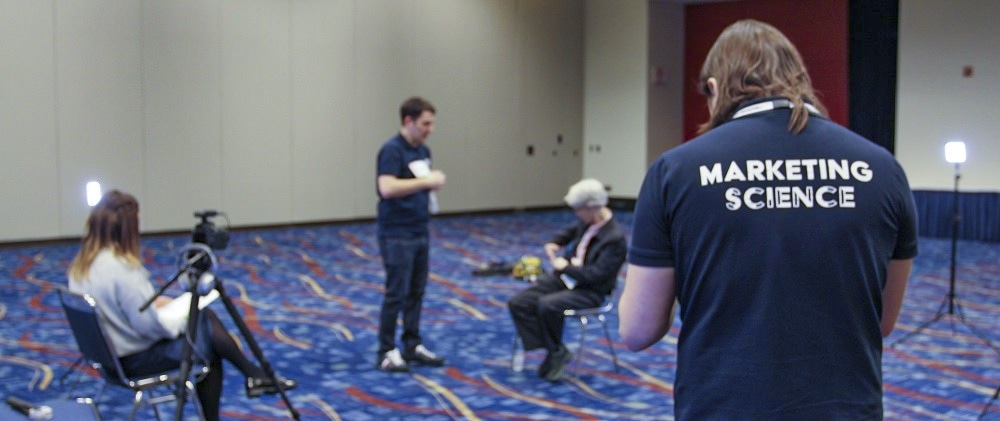
The Importance of Audio
Audio, obviously, is always a very important part of that, particularly the kind of video we do, which is often interview content, talking to scientists. Essentially, we'd film 15-45 minutes of interview footage, and then cut that down to digestible blocks. However, if you can't hear and understand what people are saying, then the video's not going to be very good - so audio's always been a huge part of that.
Transferrable Skills
And in my background, even before I was at AZoNetwork, I've been interested in audio production for a very long time. I'm a musician, my hobby is playing guitar and drums, so right back from being at school, I was into music tech, and recording music as part of that. Having those skills from audio production gave me a leg-up, a bit of a shortcut into video editing, because many of the soft-skills are the same.
Which styles of podcast work best in Science and Engineering?
There's basically two kinds:
But really that's more of a continuum, it's a sliding scale. Particularly some of the shorter daily digest news podcasts tend to be really scripted. You've got a presenter reading out the stories, and they're going to drop in clips of interviews and sound bites, but it's very highly produced, and very tightly edited.
The opposite of that is the rambling interview podcast, that Joe Rogan style where you've literally just got 2-3 people, and they just chat for as long as they want to chat for. You see more people playing around with the ground in between that; the presenter will read out an introduction that's scripted about a certain topic or news story, and then they'll go into a discussion with a guest to talk about that more freely. So it's not necessarily one or the other.
Podcasts for Science
In the scientific space, you find a scientist with a cool message to share, and you let them talk about it in an open-ended interview. We've already seen how that works in both written and video interviews, so for a podcast, that makes total sense.
When you're talking to scientists and engineers, we find some of the best moments in interviews are where we've got an answer we didn't necessarily expect, or it was a question that occurred on the spot. If you were trying to script it and plan it all too tightly, then that just wouldn't happen.
Have you had many requests for video podcast content?
We’ve been discussing these and it’s always an area where we are looking to innovate. Obviously we've started doing the Marketing Science podcast, and the demand for producing podcasts has hugely increased during lockdown.
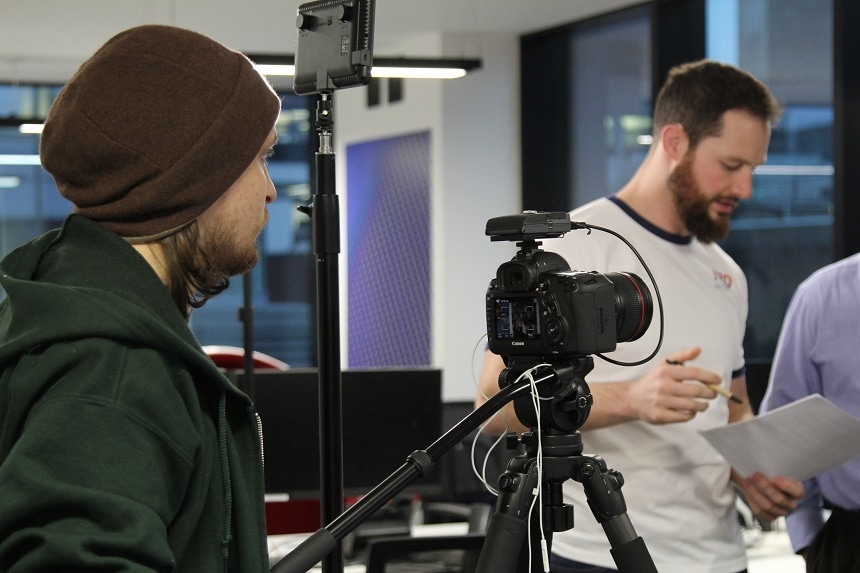
It's relatively straightforward to get good quality audio, have a call, and do an interview remotely. As soon as you want to add video to that, then everyone's got to have a decent webcam. Not everyone's comfortable being on camera, they might be in a home office that isn't ideal. There's another layer of complexity there.
The video podcasts you see that are successful tend to be the ones that are done in a radio studio-style setup, where there's a room, they have their mics and cameras set up, and all they've got to do is push go on everything.
Cost-Benefit Analysis
So if you've got that radio show, like Joe Rogan's setup, then having that video content is a really nice addition to it. But if you don't have that sort of setup, then it is quite a lot more effort to get there, and it's a case of just deciding the cost-benefit analysis. Remotely, it's pretty tricky, but it's not impossible. And then once we come out of lockdown, if we've got to go somewhere and set up a room to do a podcast, that'll be really cool content, but it will be considerable amount more effort than just pulling in a couple of microphones.
How hard is it to create high-quality unique content these days?
That's exactly the key, in the content. Recording a podcast is not particularly hard, it's no harder to use than any other tool like Zoom, and Microsoft Teams. The difficulty comes in pulling everything together and bringing that end product to a professional sounding quality.
If you're just going to turn a mic on and ramble, that's easy to do, but getting it a point where it's really slick and engaging is quite a lot harder.
That’s the same with any content, anyone can scribble down a blog post, but getting something that's gonna be engaging and hit your audience in the right way, there's a different skill to that. It's not the easiest thing to learn.
Writing from the heart
I certainly try and create/write from the heart. I did one on the diary of a marketer, how to run a podcast - not too dissimilar to what we're talking about right now.
But if you've actually been through the pain point and all of the trouble of pulling it all together from recording, to inviting the guests, to post-production, and working with people, it just resonates so much better, because it's real content about real experiences that have happened to you, and your audience is just like you.
What do you recommend for podcast hardware?
If you're hosting a podcast, it's really important that you have the best sound quality you can achieve to add a professional feel to the whole thing. That goes away very quickly if your audio quality drops as the host.
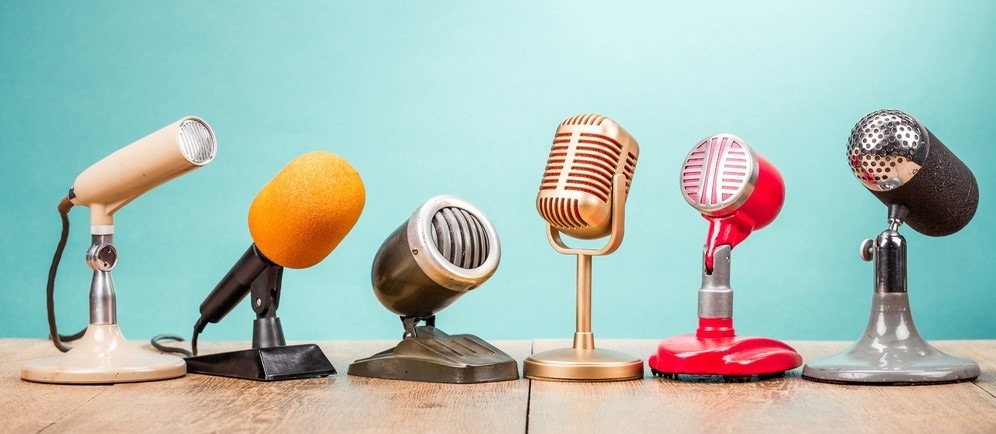
For guests, there's a little bit more leeway, I think, as long as everything's clear it doesn't need to sound like a recording studio. Everyone understands that guests are just guests, they're not recording podcasts every day, so it's not as crucial that you have the absolute top quality audio. But it's still important that everything is clear and audible, and you don't have any major issues with noise or anything like that.
You don't want to detract from the content of the message with poor audio
I’ve even recorded the difference between several different microphones and audio finishing:
The Laptop Mic
You can hear my voice sounds pretty thin, pretty distant, because my laptop's a little way across the desk from me, so it's further away. You might hear a bit of noise from the laptop itself, from the fan. This is definitely less than ideal, particularly if you're going to be a presenter or the host, you want something better than this.
Even if you're only a guest, you probably want to sound better than this, because people might struggle to understand the content of your message.
The USB Mic
So this is a USB mic. It's sat on the desk in front of me, a little bit closer than the laptop is, and it is a dedicated mic, rather than the one built-in to the laptop, so it's going to sound a little bit better, a little bit clearer. This I'd say would be fine, this kind of thing would be okay for a guest probably. It's clear enough that you're not going to miss anything with this.
Once you hear the difference between a laptop mic and a professional mic, there's no going back!
Professional Mic
Now this is back to my proper mic. The A Team! So I've got a professional condenser mic plugged into a USB audio interface that's external, so we're not even using the computer's own audio processing, it's an external pre amp, like you'd see in recording studios and high-budget podcasts.
I just happen to be enough of an audio nerd to have a couple of these lying around in my house, it's the best I've got. The rule is always, whatever you have, use the best you've got.
Post-processing
Up until now, I haven't had any post-processing on. If I turn that on now, you can hear, even with this (profesional mic), there's less of a difference, there's less to fix, but you can still improve the sound a little bit, just round off the edges, remove any stray background noise… That's some of what we do with this podcast, with all the guests and with your recordings, just polish them up a bit. But if you have a nice, solid microphone like this to start with, then that becomes much easier.
What would you recommend would be the minimum hardware that people use?
Don't use the laptop mic, get something external, something like either AirPods or a fairly affordable USB headsets that have headphones and a mic built-in.
The further away from the source of the sound you are, the more noise from the room you're going to pick up. So this mic that I'm speaking into now is literally right under my mouth, and it just makes the whole sound much more direct. Even a cheap headset will do that automatically. You get less echo from the room and less background noise, just because the mic's right next to your mouth.
Ask about podcast production
So I think if you're going to do any sort of podcasting, or remote interviews, even a lot of calls, it's definitely worth spending a few 10s of pounds or dollars. They don't have to break the bank, but something that gets a decent quality mic near to your mouth will have the biggest improvement.
It's the difference between that tinny tablet or phone on loudspeaker against something that's purpose-built for audio and for audio conferencing.
In a laptop or a tablet, it's got a microphone and it's got speakers, but they're not the priority. They've spent more money on the screen, and the memory, and the processing.
Prioritizing Audio
The audio is just whatever they can fit in the box and fit in the budget. It's going to be a compromise with any device that does it all like that. As soon as you start buying external devices, or ones where audio is a much bigger part of what they do, it's going to get a bigger part of the development and the manufacturing budget - they're going to get better parts.
Limiting factors
The other thing is more space. the Echo Show, is a larger device, so you can put a bigger speaker in it. If you're looking at AirPods, or a laptop, they've only got so much space where they can fit a microphone in.
What should your audio software be able to do?
One of the most popular pieces of software for editing podcasts is Audacity, which is completely free. We use REAPER, which has a good free trial, and the licenses are pretty affordable. That's because that's the one that I use, the one that I'm accustomed to, so I've taught you to use that as well.
With editing the audio for a podcast, there's nothing really, really complicated. So even if you're using something like REAPER, or something like Pro Tools, or Adobe Audition, there's a ton of features in there that you're not going to need to use.
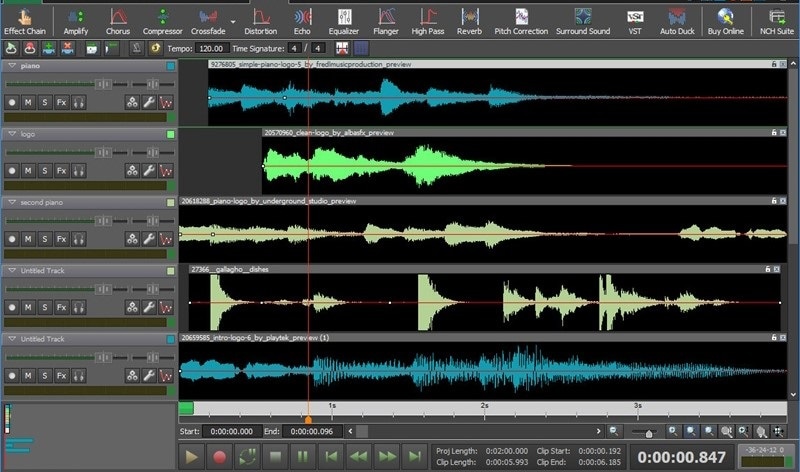
You need something that'll let you balance the levels between the different speakers, particularly if you're recording remotely, you're going to have different channels for each speaker that you've recorded. Some people might be louder than each other because of their voice or their microphone, you need to balance those out so they sound roughly even.
You also need equalization, noise reduction, and overall compression and volume levelling.
It's training your ear, to some extent. Even if you are just fixing fairly simple problems, I've been doing this for long enough that I can listen to the audio, hear that there's a problem and say, "Yeah, I know what that problem is, and I know how to fix it," and just grab the tool and do it. It's like anything, if you know your tools, what they do, and you're used to finding the problems and applying the right tools, then it's straightforward. But getting to that point does take some time.
How do you decide which guests you have and which content you're going to choose?
Anyone that has an interesting perspective that you find interesting, then will lead to a good conversation. It might be something that's a little bit outside your ballpark, or it's something that you're familiar with, but they have a completely different perspective on it. That will translate into interest for the listeners. And that interest will feed your enthusiasm, purely because you're enjoying the conversation.
Why do people do podcasts?
It's like any content marketing, it's another channel.
It's another way that people to digest content. Whatever audience you have, it's another way to connect with them. When they might not be able to sit down and read a blog post, or they might not be able to watch a video. You're making it more likely that you'll grab their attention because there's a whole other portion of their day, when maybe they're commuting, or going for a jog, or whatever it is, doing the washing up, they can listen to a podcast when they might not be able to consume other sorts of media - Which is exactly why people like them.
As Marketers, that's valuable real estate and attention time, you want to be involved in that.
How do you distribute a podcast among the platforms like Apple and Spotify?
This is something that's become a lot easier. There are plenty of distribution platforms out there, which will help you do exactly that. Essentially all these Players, whether that's Google, Apple or Spotify, they have a format which they want your podcast to be delivered to them in:
- Upload audio files in a certain format
- Show Title
- Episode Title
- Description
- Keywords
- Tags, artwork etc. all of that will need to be in a particular format.
Given that the podcast was invented by Apple originally, Apple Podcasts set the standard which people have mostly stuck to. These podcast distribution platforms allow you to upload the information in a fairly simple form-filling way, like posting a blog on a CMS, and they distribute that in a way that is readable by all of these different services.
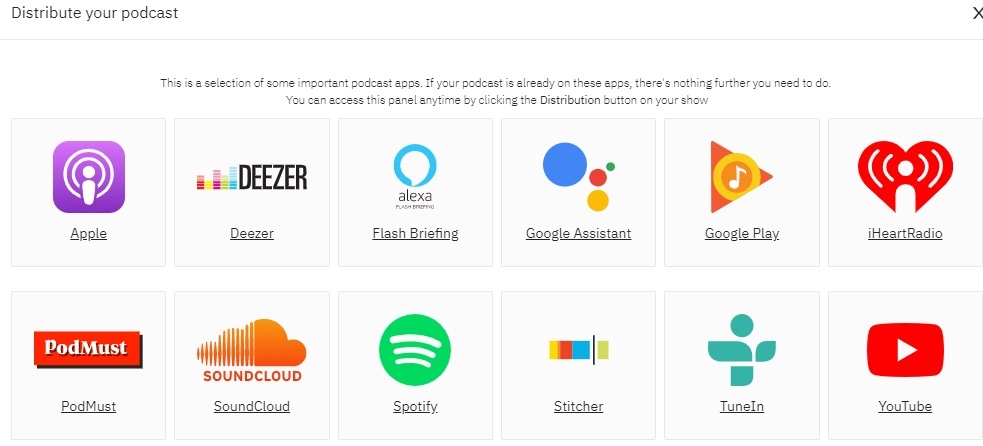
So you publish it once through your distribution channel of choice, and it will then post that on, send that on to the various players, and listening apps, and streaming apps, and you’re everywhere!
Is Apple the gold standard?
When you first publish your podcast, it needs to be approved to appear on all these platforms. Certainly, with Apple, that can take a couple of weeks - Partly because they are a bit more stringent, because they're seen as a gold standard. Some of the smaller podcast apps, will just copy it from Apple assuming that it's fine.
The first episode appears on a couple of platforms straight away, and a couple days later it appears on a few more, and then another couple days later it's like, "Oh good, Spotify, that's happened now, we're on Spotify," and then it's a whole week later before it turns up in Apple Podcast and iTunes.
How does Spotify integrate its analytics?
The analytics from Spotify Podcast plugs back into Acast, that's probably one of the things that sets them apart is what their analytics API is like, something that will play into people's choice for which one they use.
Google Podcasts, Google Music, YouTube, Google Play, what’s the difference?
The Google ecosystem for podcasts is a little bit fragmented. Their equivalent to Apple Music or Spotify is Google Play Music. And if you're in the US or Canada, I believe the podcasts are part of Google Play Music, just like they're part of Spotify, it's just another thing that you can get in there.
But that's not the case outside of the US and Canada. Then you have a separate app called Google Podcasts, which is simpler and more stripped back - it doesn't have all the features of Google Play Music, but it does have all the podcast feeds.
You’ve also got YouTube, which isn't specifically a podcast platform as such, but there are some really high profile podcasts, like Joe Rogan and others, that use it as their main distribution channel because video plays a large part of it
Google are planning, at some point, to roll Google Play Music into YouTube Music, because actually at this point, a lot more people use YouTube as a music discovery service than use Google Play. So they're consolidating those together… another really good reason to use a distribution tool, like Acast, or Podbean is that they'll handle all this.
It's not too difficult per se, but you've actually got about 50 different hoops to jump through.
No step is particularly complicated, but to get things approved in all these different places, there are a few steps to go through. Once you've got your show approved though, adding new episodes to that is relatively simple.
It's something to bear in mind if you're starting a new podcast, it does take some time, and you should allow a few weeks at the start. If you have a launch date in mind where you need it out for some event, or a product launch or something, give yourself plenty of time ahead of that to make sure everything's ready.
How have you seen Social Media used to promote podcasts?
Some of the principles of SEO apply just as much to podcasts. Google will try and present a range of multimedia in its search results. So if you have a podcast, an audio listing, as well as a blog post about the topic, or an article, it gives you the chance of an extra bite of the cherry, an extra search result there.
And yet the way most people browse social media, I don't know if they'll necessarily be ready to sit down and listen to a 40 minute podcast. They're looking for quickly-consumable piece of content at that point, so something we've been trying out is video snippets.
Video Snippets
We'll take a snippet of the audio from a podcast, which had a particularly nice sound bite that had some salient point in it, and we'll make a little video clip of that, just showing the audio waveform and some subtitles, and the title of the podcast, as a 60 seconds teaser. Short clips and video are a type of content that do very well on social media - people are quite happy to pause their scrolling for a few seconds to a minute, to watch something that might be of interest to them.
Even if they don't listen to the whole thing there and then, at least you've got that one point across to them.
If you're running a podcast, you need to be found on the listener's terms. So you need to be in ALL of the relevant podcast players, because if you miss out on Spotify or Apple Podcasts, then you're missing your audience, and failing them from a UX perspective. We give people the option of listening to it on any platform and any device and we optimise each episode for SERPs. Judging from the analytics, we get many of our listeners on desktop at AZoNetwork.com, but then there's still a lot of people listening on the go with Apple Podcast and Spotify.
Ask about podcasts
How do you see the role of the podcast in a marketing manager's toolbox?
Any content that you can produce while everyone's working remotely and still get high quality will be extremely valuable.
It's grabbed more people's attention as a potential avenue, and lots of people have been meaning to do it for some time… But I think because there have been other options, in-person video shoots, trade shows, and other marketing channels, podcasts have only just come to the forefront. I think a lot of people have been wanting to get into it for a while - It's something we'd talked about doing for quite a long time, and it's been the lockdown situation that's pushed us into doing it. We’re not going to stop. Even if we can do it in the office again in person, we're only going to do more of it.
And it will become a very valuable channel.
Check out our latest blog: Diary of a Marketer - How to Run a Podcast
Listen and Subscribe to the Marketing Science Podcast
Subscribe | Spotify | Stitcher | Apple | iHeartRadio | Mobile | Download